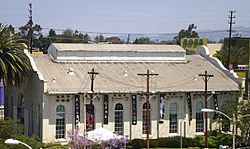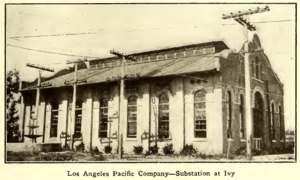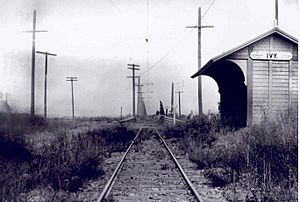Ivy Substation facts for kids
 |
|
| Address | 9070 Venice Boulevard Culver City, California |
|---|---|
| Owner | City of Culver City |
| Operator | The Actors' Gang |
| Capacity | 99 |
| Opened | 1992 |
|
Los Angeles Pacific Company Ivy Park Substation
|
|
| Location | 9015 Venice Blvd., Los Angeles, California |
| Area | 1.1 acres (0.45 ha) |
| Built | 1907 |
| Architectural style | Mission/Spanish Revival |
| NRHP reference No. | 81000155 |
| Added to NRHP | March 25, 1981 |
The Ivy Substation is a special building in Culver City, California. It is also known as the Ivy Park Substation or Culver Substation. Today, it is a small theatre with 99 seats.
Long ago, this building held big machines that made electricity. This electricity powered electric trains and streetcars nearby. The Ivy Substation was added to the National Register of Historic Places in 1981. This means it is an important historical place.
Contents
History of the Ivy Substation
Building a Power Station
The Ivy Substation was built in 1907. It was made by the Los Angeles Pacific Railway company. The building has one story and is shaped like a rectangle. Its style is called Mission Revival, which was popular at the time.
This building was a "traction substation." This means it helped power electric trains. In 1911, the Los Angeles Pacific Railway became part of the Pacific Electric railway.
How It Powered Trains
The building is made of brick covered in stucco. Inside, it had huge machines called "rotary converters." These machines changed very strong alternating current (AC) electricity into direct current (DC) electricity. This DC power was 600 volts.
This special electricity was used to run electric streetcars and trains. These trains traveled on lines like the Venice Short Line and the Santa Monica Air Line. The substation kept working until 1953.
From Power Station to Theatre
After 1953, the old power machines were taken out. The City of Los Angeles bought the building. It stayed empty for many years.
In the early 1990s, the building got a new life. The Culver City Redevelopment Agency and the City of Los Angeles worked together. They fixed up the building to turn it into a community theatre.
Since then, it has been home to The Actors' Gang, a theatre group. The building is important because of its connection to the history of transportation in Los Angeles. It is also valued for its unique architecture.
See also
- Culver City station, which used to be called Ivy station.
- Pacific Electric Railway Company Substation No. 8
- Pacific Electric Sub-Station No. 14
 | John T. Biggers |
 | Thomas Blackshear |
 | Mark Bradford |
 | Beverly Buchanan |



